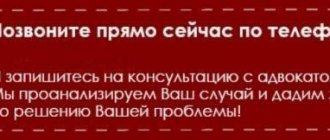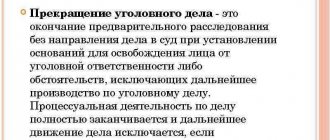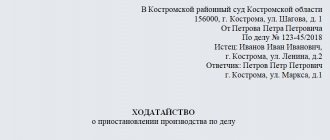Everything about criminal cases
Go to list of questions
| Situation : The investigator does not want to reclassify my actions to less serious ones. Explaining that the investigation is not over yet, that the final assessment will be given upon its completion. But at the moment, based on unfounded and unconfirmed qualifications, as especially serious crime, extends the preventive measure. Question : What to do ? How to change an incorrect qualification? |
ANSWER:
— I don’t see any practical point in fighting qualifications at the investigation stage through complaints. Because it won't bring results.
Overqualification
- whenever there is such an opportunity, the investigation strives to charge the accused with as much as possible:
A)
are charged with the most serious articles of the Criminal Code.
b)
the maximum number of episodes is charged.
- at the same time, already at the stage of bringing charges
it is already clear to the investigation in advance that the charges will be clearly softened at the trial stage - the qualifications will be changed to more lenient articles, some episodes will not be confirmed.
Why is this being done?
- Why does the investigation need this, what is the point?
A)
First of all, this is a safety net against
an acquittal
; the greater the weight of the accusation, the less likely it is to be completely acquitted.
b)
this provides an opportunity for “trading” like “you recognize this episode, and for this reason we soften the qualifications.”
Initial qualification under the most “terrible” articles makes the accused more compliant. Also, the more serious the article, the easier it is to choose such a preventive measure as detention
.
V)
This is beneficial for absolutely everyone:
- it is beneficial for the judge, he gets the opportunity to “show kindness.” That is, “the evil investigator imposed a serious charge, the “good judge” softened the charge. This situation creates a picture of a fair trial that is psychologically convenient for the judge.
- it is beneficial for the lawyer, he gets the opportunity to claim that he has partially “ruined” the case.
Does it make sense to apply for a change in qualifications?
?
— this question can only be answered by studying the situation in a specific case. Because in some cases such a petition will make sense, but in others it will cause harm.
A)
on the one hand, by submitting a petition to the investigator to change qualifications, we receive the following positive aspects:
— we clearly indicate our position, which we will adhere to in the future (in some cases this is exactly what should be done).
— we deprive the court of the opportunity to groan in the future, “Why didn’t you declare this at the investigation stage?” (judges often make such reproaches)
b)
but there is another “side of the coin” here. In a petition to change qualifications, we will have to present our arguments; in fact, we “lay all our cards on the table.” That is, the investigator, the prosecutor - get the opportunity to take countermeasures against these arguments (interrogate witnesses, order another examination), which they would not have done if we had not revealed these “cards”.
That is
: A decision on whether to file such a petition will have to be made individually for each criminal case. Here it is simply impossible to give unambiguous advice: they say, you must submit a petition to the investigator - or, conversely, submit such a petition only in court. What would be a correct defensive move in one case, would be harmful stupidity in another case.
There is no point in appealing qualifications at the investigation stage
Requirements for retraining will most likely be rejected. Neither the judge, nor the prosecutor, nor the investigator simply need this. Moreover, it is even better for the judge if the case comes to him with excessively heavy qualifications, and he passes a sentence with a softening qualification.
If the investigator refuses to satisfy such a request (which is most likely to happen), is it possible to fight this refusal? Answer: you can fight, but is it necessary?
— most often it makes no sense to make such demands, we explain why:
A)
to appeal this decision of the investigator in accordance with Article
124 of the Code of Criminal Procedure
(to the head of the investigative department, the prosecutor), because The investigator usually makes a decision on qualifications with the verbal permission of his superiors, therefore it is useless to complain to them.
b)
It will also not be possible to appeal this decision of the investigator to the court under Article
125 of the Code of Criminal Procedure
- the court will either not accept such a complaint for consideration in accordance with paragraph 3.1
Plenum No. 1 “Actions (inaction) and decisions, the verification of the legality and validity of which falls within the exclusive competence of the court considering the criminal case on the merits, are not subject to appeal under Article
125 of the Code of Criminal Procedure
” (and qualification is precisely within the exclusive competence).
- or, if the court accepts such a complaint for consideration (in practice this happens, the complaint is accepted for consideration - due to the judge’s illiteracy, contrary to the above explanation of the Plenum), then it will refuse it. This can be said with 100% confidence. A judge will never interfere with the competence of an investigator ( clause 3, part 2, 38 of the Code of Criminal Procedure
) and dictate to him how to qualify the actions of the accused.
The judge simply cannot do this; he is expressly prohibited from doing so ( clause 21
of Plenum No. 1).
Change of qualification
- a change in qualifications can be made in court (according to Part 2 252 of the Code of Criminal Procedure
and
paragraph 20
of Plenum No. 55) and this is exactly how it happens most often.
— at the same time, a change in qualifications is possible not only in the court of first instance, but also in appeal ( clause 2, part 1 389.18 of the Code of Criminal Procedure
) and even in cassation (
clause 17
of Plenum No. 19).
Recommended materials
:
Qualification of the crime
(legal assessment), possibility of change
Return to list of questions
Seek advice
Why do you need a sample?
The need to go to court arises when the right of an individual or legal entity is violated and this person has no other way to protect it other than going to court, unless the law provides for an alternative.
You have decided to go to court. You have two options: first, find a specialist; the second is to draw up a statement of claim (statement) to the court yourself. In the first case, everything is quite simple, you need to pay for the work of a specialist and receive legal services in the form of a ready-made statement of claim. In the second case it is more difficult.
Writing a statement of claim to the court will require you not only to master the terms of law, but also to know the current legislation. If you do not have this, then you will need samples, templates, standard forms available on our website.
How to use the sample correctly
It must be remembered that sample statements of claim come in different contents. Some can be made in the form of a template (standard form), others in the form of actual statements of claim. The claim template, as a rule, does not contain a detailed description of the circumstances that led to the application to the court. The author of the application is asked to include these circumstances in the content of the statement of claim independently. However, this is not easy to do without proper preparation. If you are unable to correctly draw up a statement of claim based on a template, then you are looking for samples of statements of claim with ready-made content. The samples available on the site are relevant for both beginners and professionals. The samples are compiled taking into account current legislation. Some samples can be used without significant editing. You only need to add your specific circumstances to the contents of such a sample and sign it. It must be remembered that an incorrectly executed document will be left without consideration, which means that only a thoughtful approach to filling it out will guarantee that the application you submitted will not be left without attention.
Rules for downloading information
The Internet allows you not only to view a variety of information, but also to “take” it for yourself. You can find the materials you need and then download them to your computer disk. In this case, the information becomes yours. This is beneficial because at any time you can open it without the Internet, move it to a flash drive or disk. It is even possible to send it via email or Skype. If this information is deleted from the Internet, it will still be available to you in an “unchanged” form. This action of “taking” from the network is usually referred to as downloading. We remind you that you can download both text data and video, music, photos and computer programs. The problem with downloading may be that there is a different download option or even several download options for each type of data. We “download” text in one way, video or music in another, photos in a third, etc. Unfortunately, there is no one universal instruction; in each case it is different.
You can in the following formats: TXT, DOC, DOCX, WORD
You can order the selected sample in the following formats: TXT, DOC, DOCX, WORD from the site archive.
Order a ready-made document
USEFUL LINKS:
Part 1 art. 105 of the Criminal Code of the Russian Federation. Reclassification by the court under Part 1 of Art. 109 of the Criminal Code of the Russian Federation “Case of an accidental shot”
One gray day, when the weather outside was whispering: “close the office and go home,” a girl came into my office. Well, I thought, maybe she’ll lighten the gloomy mood, since she didn’t look very gloomy, therefore, she came on some civil matter.
However, I was wrong. The business that began with this meeting in the office, I think, will take one of the places of honor in my practice.
The story began in May 2022. Two security officers took up duty to protect the territory at a checkpoint at one of the Rosneft fields near the city of Surgut, in the Khanty-Mansi Autonomous Okrug.
During the day, work was in full swing, and in the evening, or rather at night, in order to pass the time, the guys decided to take a little break from service. The rest resulted in dinner and drinking 2 liters of alcohol, confiscated during the day from one of the drivers passing through the checkpoint to the rotational camp. Everything would be fine, but one of them (the victim), as luck would have it, decided to tell my client about his previous military service. To make the story more convincing, the victim took out the service weapon he had.
I demonstrated, showed and accidentally removed the safety and reloaded. And now the cartridge is in the barrel. The conversation was not so short, but by the end of it the victim began to actively wave his hand with the weapon, pointing it towards himself, then pointing it towards my client.
All this was recorded on the CCTV camera that was in the room. But then, by an unfortunate coincidence, the victim and my client find themselves in the blind spot of the camera for several minutes. And then the fatal shot occurs.
I got involved when enough time had passed since my arrest. The position of my client, which he voiced during arrest and interrogation as a suspect and accused, remained the same. The shot happened accidentally when my client was trying to take the weapon from the victim. However, the investigation charged him with Part 1 of Art. 105 of the Criminal Code of the Russian Federation.
Well, then the dry lines of the case materials and the first indictment.
So, in particular, the indictment states that “during the drinking of alcohol in the guards’ room at the checkpoint “A” of the F. field, in the period from 04 hours 45 minutes to 04 hours 49 minutes 05/16/2018, a more precise time during investigation has not been established, M., armed with a service pistol MP-71 9×17, suitable for firing shots and causing fatal wounds to a person, equipped with 10 rounds of 9-caliber cartridges, acting intentionally, realizing the socially dangerous nature of his actions, anticipating socially dangerous consequences in the form P’s death, not wanting it to happen, but consciously accepting the possibility of causing the latter’s death, put the barrel of a pistol to the right temporal region of P’s head, from which he fired one shot, as a result of which he caused damage to P in the form of a gunshot wound through the head...
The specified damage refers to bodily injuries that caused grievous harm to health on the grounds of danger to life, and is in a direct cause-and-effect relationship with the death of P.”
As can be seen from the above fragment of the indictment, the preliminary investigation body did not consider the question of establishing the motive and purpose of the crime committed by M and was not included in the scope of the charges brought.
I will not dwell on the preliminary information stage, but I will say that all my attempts to convince the investigation that there is no evidence of intent in the actions of my client in the case and the investigation has not established either a motive or a goal have not been successful. The criminal case successfully went to court.
By the verdict of the Surgut District Court of the Khanty-Mansiysk Autonomous Okrug-Ugra dated February 6, 2022, M was convicted under Part 1 of Art. 105 of the Criminal Code of the Russian Federation and sentenced to 11 (eleven) years in prison.
It is interesting that the court itself decided to establish the motive and indicated in the verdict the hostile relationship between the defendant and the victim.
Preparing for the appeal hearing, I decided to strike the main blow precisely at the weakest point of the sentence, namely, that the motive and purpose as direct components of the subjective side of the crime provided for in Part 1 of Art. 105 of the Criminal Code of the Russian Federation, i.e. the murders were not initially established by the preliminary investigation, nor were they established by the court, despite indications of them in the verdict. There is no evidence of the motive given by the court, namely a sudden personal hostile relationship between M and victim P, in the case materials.
By an appeal ruling of the Judicial Collegium for Criminal Cases of the Court of the Khanty-Mansiysk Autonomous Okrug-Ugra dated May 16, 2022, the sentence was overturned. The criminal case was returned to the prosecutor of the Surgut district of Khanty-Mansi Autonomous Okrug-Yugra to remove obstacles to its consideration by the court.
The grounds for overturning the sentence were significant violations of the norms of the Code of Criminal Procedure of the Russian Federation during the investigation of the criminal case and during the consideration of the case by the court of first instance.
Thus, in the appeal ruling of the Court of Khanty-Mansi Autonomous Okrug-Yugra it is stated that the court’s conclusions regarding the motive (based on personal hostile relations) and purpose did not find their objective confirmation and are far-fetched and contradicts the actual circumstances of the case.
After returning, the investigation ordered a situational examination. I had a great desire to appeal this decision, but my intuition stopped me. And for good reason. The experts indicated that the shot could have been fired both under the circumstances stated by the prosecution and under the circumstances indicated by the accused, i.e. There could have been an accidental shot.
My joy did not last long. The investigation, although upset by the results of the examination, was not embarrassed. A new charge was brought against my client.
According to the new indictment, M, armed with a weapon in his possession, but in the service of P, suitable for firing shots and inflicting fatal wounds on a person with an MP-71 9x17 service pistol equipped with 10 9-caliber cartridges, acting intentionally and without motive , with the aim of taking life, Realizing the socially dangerous nature of his actions, foreseeing socially dangerous consequences in the form of P’s death, not wanting them to occur, but consciously accepting the possibility of causing the latter’s death, he pointed the barrel of a pistol from which he fired one shot….
Thus, the preliminary investigation body decided to avoid proving the motive and purpose of the crime of which my client was accused.
All this did not prevent the Prosecutor of the Surgut region of Khanty-Mansi Autonomous Okrug-Yugra from approving a new indictment against M, i.e. agrees with the absence of a motive in M’s actions to commit premeditated murder and send the criminal case to court.
Based on the analysis of all the evidence available in the case materials in the totality of their content, I was convinced that this evidence in no way allows us to conclude that there was a motive for committing the murder. That is, in the few minutes that the defendant and the victim were outside the surveillance camera area in the premises of checkpoint “A”, such circumstances should have arisen that led to M’s intent to deliberately deprive the victim of his life. In this criminal case, no circumstances were established at all that could, even theoretically, in conditions of non-obviousness, allow M to have an intent to kill.
Therefore, during the court hearing, the defense stated the need to qualify the defendant’s actions under Part 1 of Art. 109 of the Criminal Code of the Russian Federation.
I insisted during the judicial investigation that, taking into account the commission of this crime in conditions of non-obviousness and the impossibility of establishing with certainty, based on the totality of evidence in the case, and not on assumptions: who fired the shot, under what circumstances the shot occurred, whether there were any active actions of the victim, other circumstances, it is impossible to conclude that M’s guilt has been proven, that he intentionally (with direct or indirect intent) caused the death of the victim.
In the theory of criminal law there is the term situational murder, i.e. committed instantly based on the situation, it is often called motiveless when it is difficult to establish a motive. But at the same time, all other signs of the crime must be established, including the purpose of committing the murder, the mechanism of commission, in our case, that the shot was not fired accidentally, but consciously and purposefully. That is, this term is applicable when there is indisputable evidence of the actions of the accused (witnesses, camera recordings, etc.).
The practice of solving and investigating crimes is most often characterized by the positive results of the activities of the investigator and operational employees of the inquiry agency, successful tactical decisions, competent use of tactical techniques and complexes, effective planning and interaction of participants in the investigation. However, there is also a negative phenomenon - investigative errors, which also need to be studied due to their harmful impact on the quality and results of the investigation.
In the theory of criminal procedural law, there is the following definition of an investigative error: “an investigative error is an incorrect action or inaction of the investigator, expressed in the one-sidedness and incompleteness of the study of the circumstances of the case, a significant violation of the criminal procedural law, resulting in the investigator making an incorrect final decision, illegality and the groundlessness of which was stated in the relevant act by the prosecutor or the court" (Soloviev A.B. Causes of investigative errors // Ibid. P. 28; Shafer S.A. Structure and general characteristics of investigative errors // Ibid. P. 18).
Based on the foregoing, an error can be defined as an unintentional, unrecognized act of the investigator (interrogator) caused by an incorrect perception of the current investigative situation or an incorrect choice of means to resolve it, which can lead to a deterioration in the investigative situation or failure to achieve results that are significant for the criminal case. .
Errors can lead to various consequences, including failure to establish circumstances excluding the criminality of the act (Chapter 8 of the Criminal Code, Article 26 of the Criminal Code of the Russian Federation).
I think in our case there was just such an investigative error. When the investigation knowingly understanding the impossibility of proving Art. 105 of the Criminal Code of the Russian Federation, and having in fact evidence of the commission of M, a crime under Art. 109 of the Criminal Code of the Russian Federation, nevertheless deliberately took the path of investigation and prosecution under Art. 105 of the Criminal Code i.e. deterioration of the investigative situation.
On December 30, 2022, the Surgut District Court, having considered our criminal case, qualified the actions of my client in accordance with Part 1 of Art. 109 of the Criminal Code of the Russian Federation and imposed a sentence of restriction of freedom for 1 year and 6 months, but since my client was in custody for more than a year, he was immediately released in the courtroom due to the actual serving of the sentence.
The weather outside that day was beautiful. Last working day. Passers-by were hurrying home. My client went to celebrate the New Year 2022 at home in the Kurgan region. Well, after the verdict was announced, I had a snack on the way, boarded the plane, put on my headphones and dozed off. I woke up already when the plane landed in Tyumen.
Who and how can change the classification of a crime?
First, the investigator is involved in qualifying the case. It is he who first determines the article of the Criminal Code under which the case will be considered in court if it is supported by the prosecutor, who has the final word before the start of the trial. Thus, the prosecutor can re-qualify the article of the criminal case or not. Further requalification is possible in court, including the first, second and highest instances.
The law limits the possibility of reclassification, especially if the situation of the accused worsens (Article 10 of the Criminal Code). There are different rules at different stages of the criminal process. At the stage of preliminary investigation, when the factual circumstances of the case are clarified, the investigator can easily re-qualify the article of the Criminal Code. At the same time, he can change the classification to either a more or less serious crime.
The prosecutor and the judge cannot change qualifications so easily. The first may apply a “softer” article of the Criminal Code in the indictment. But if he wants to classify the crime as more serious, he must first return the case to the investigator to bring a new charge.
As for the court, it can change the classification of a crime under the Criminal Code of the Russian Federation if it considers it erroneous. As a rule, an error in the classification of a crime arises due to an incorrect interpretation of the elements of a crime, due to a logical error in the process of delimiting crimes, due to qualification “with a reserve” (as a more serious crime), etc.
In addition, the court of the second and higher instance can also change the qualification to another article of the Criminal Code. As lawyers note, in particularly complex cases in judicial practice the classification of the crime has changed several times.
Conditions for requalification
In a trial, reclassification of a case is possible only if this does not worsen the position of the defendant. Thus, the court does not have the authority to replace an article of the Criminal Code (CC) with a more serious one or to come up with a new charge with aggravating circumstances.
Although the judge himself cannot reclassify the case to a more severe article of the Criminal Code, under certain conditions he has the right to return it to the prosecutor for this purpose. Reasons for return:
- there are procedural violations - for example, the accused was not explained his rights or errors were identified in the case materials when drawing up the indictment;
- previously unknown circumstances were discovered - for example, the crime was carried out not by one person, but by a group of people;
- additional consequences of the crime committed occurred - for example, the infliction of grievous bodily harm led to the death of the victim.
If the judge has no grounds for returning the material to the prosecutor, then the case proceeds within the framework of the article of the Criminal Code chosen by the prosecution. However, the court can independently reclassify the crime to another if the punishment is less severe. But this also requires reasons, for example:
- actual data has changed. For example, the facts of the act may not be confirmed or interpreted in favor of the defendant as a result of a forensic examination;
- criminal legislation has changed;
- the harm caused does not correspond to the article that the defendant is charged with. For example, the amount of damage was incorrectly assessed.
In addition, if there are circumstances that can mitigate the guilt in the case, the judge is obliged to reclassify the article. At the same time, the objections of the investigator or prosecutor should not influence his opinion in any way. The court can change the classification of the crime independently or on the basis of a petition from a party to the proceeding. If there is insufficient evidence to change the article, the judge must refer the case for additional investigation.
The lawyer's petition will speed up the investigation
70-year-old Valery Skachkov became a victim in a criminal case two years ago, but the police have not yet found the perpetrators, and hopes that they will be identified and punished according to the law are diminishing every day. Realizing that independent attempts to achieve justice were futile, the pensioner turned to our legal center for help. A team of lawyers began defending the victim at the investigation stage and managed to achieve significant results: law enforcement officers finally confronted the victim and the suspect, and the prosecutor's office and the police are now studying a request to reclassify the criminal case.
“The satisfaction of the request of the team of lawyers of the legal center, sent to the prosecutor’s office and the police, to reclassify the criminal case from Article 161 of the Criminal Code of the Russian Federation “Robbery” to Article 105 “Murder” will lead to its transfer to the Investigative Committee, which will certainly affect the effectiveness of the actions of law enforcement officers,” - says criminal lawyer Alexander Spirichev.
The attack on Valery Skachkov occurred in the fall of 2022. He was returning to his private home after completing a transaction for the sale of a cottage and a car in the amount of five million rubles. In one of the rooms of the house, two unknown men were waiting for him, having entered through the window. They beat the man for several hours and then handcuffed him and left him on the floor.
“The victim was on the verge of death. The attackers, having broken several ribs, pierced his head and damaged his spine, handcuffed him and completely immobilized him, depriving him of the chance to free himself or call for help. In fact, they left the man to die in his own home. Only a day later he was accidentally found by a worker, whom his son had sent to look for his father, who had not been in touch for a long time,” explains criminal lawyer Alexander Spirichev.
According to doctors, a few more hours without medical help and the man could have died. The attackers' goal was money received as a result of the transaction, but the victim did not have it with him. The loot of the robbers was 650 thousand rubles, which the pensioner kept at home. Judging by what the attackers knew about the sale of real estate and a car, they were working on a tip, but they were never able to find the young people.
“Skachkov managed to independently find one of the suspects, but the police, for an unknown reason, were able to conduct a confrontation only after our legal center began representing the interests of the victim. At the same time, the investigators did not eliminate the contradictions between the victim and the suspect, but rather acted as the latter’s lawyers. We insist on reclassifying the criminal case from Article 161 of the Criminal Code “Robbery” to Article 105 “Murder”, which was not completed for reasons beyond the control of the culprit. If this happens, the materials will be transferred to the Investigative Committee, where the work will be carried out much more efficiently. In turn, we will monitor the development of the situation,” says criminal lawyer Alexander Spirichev.







